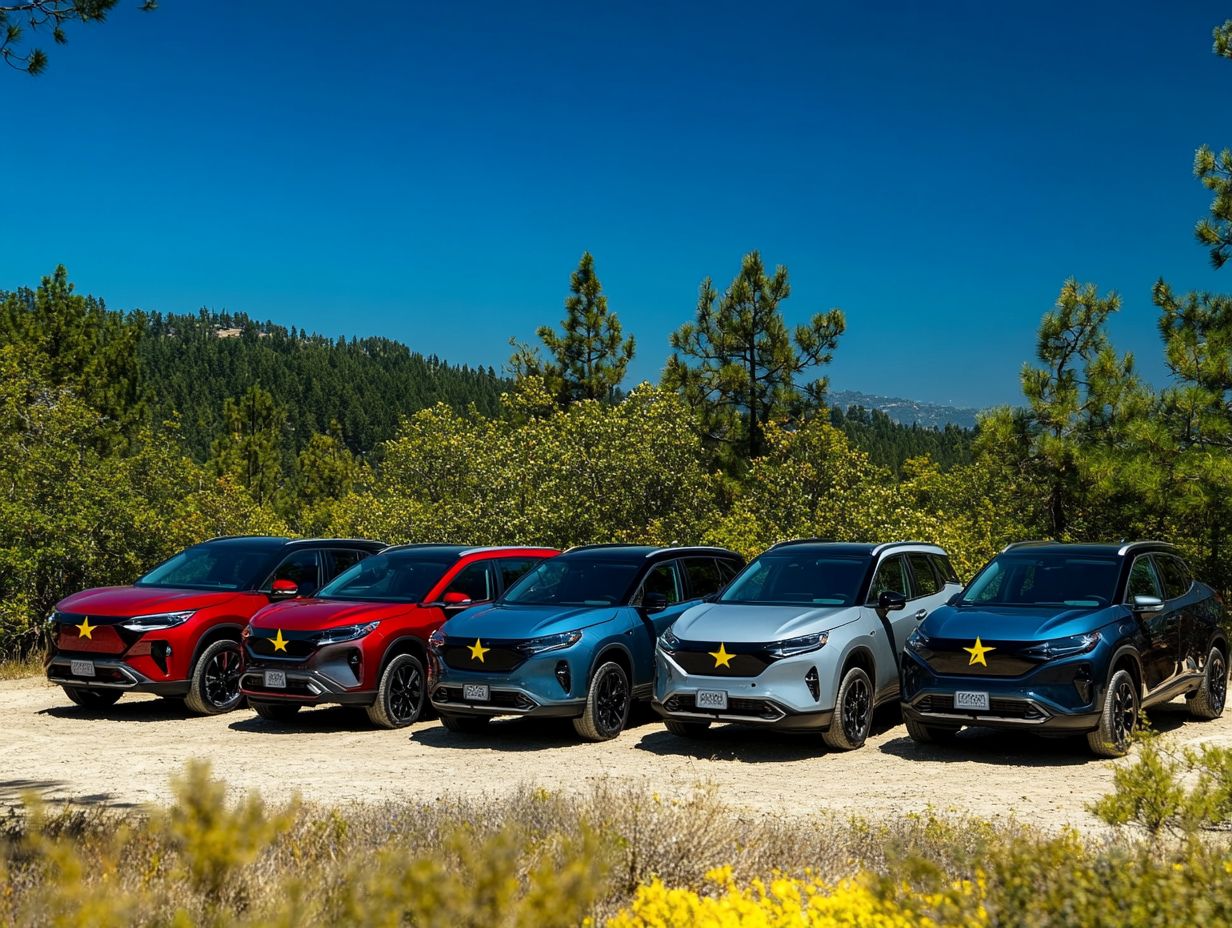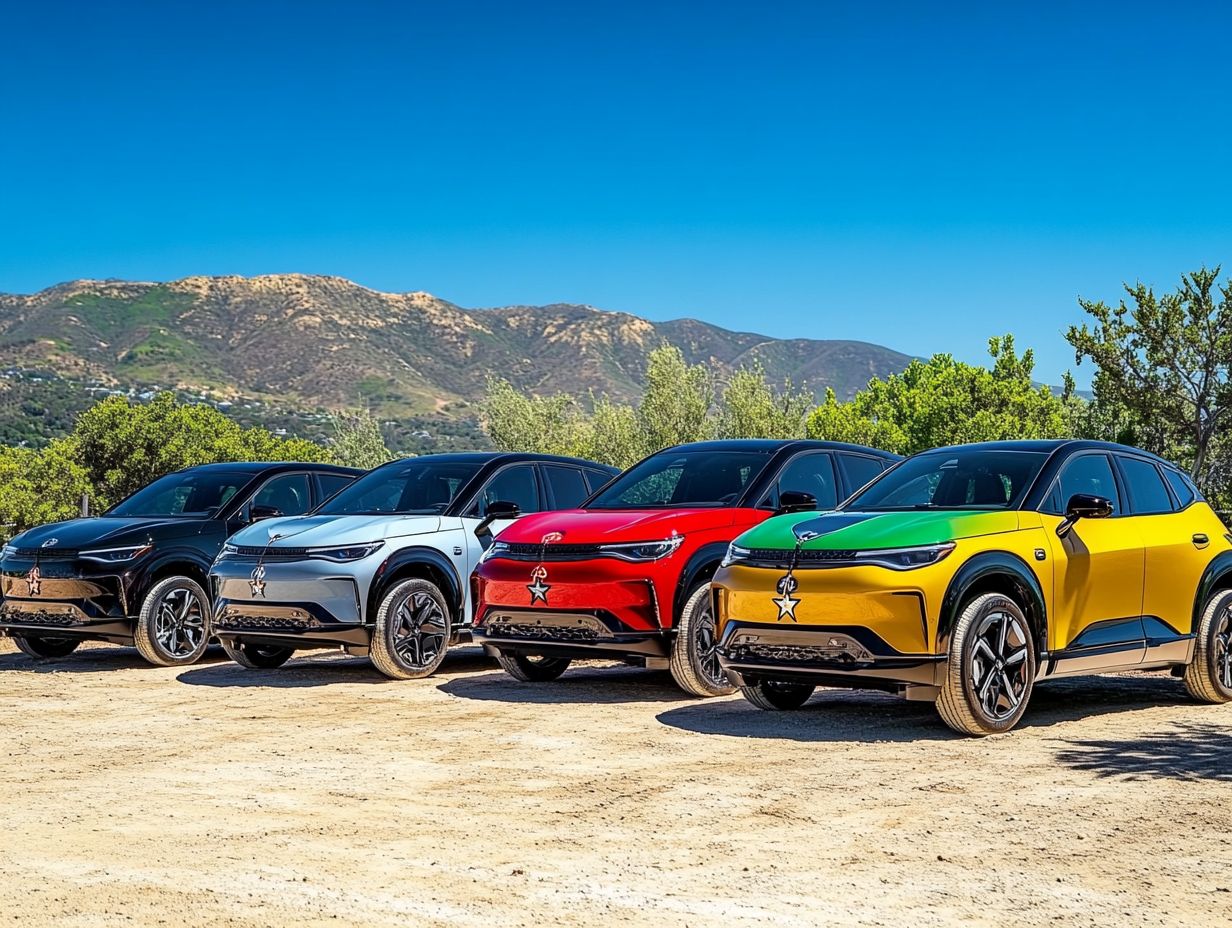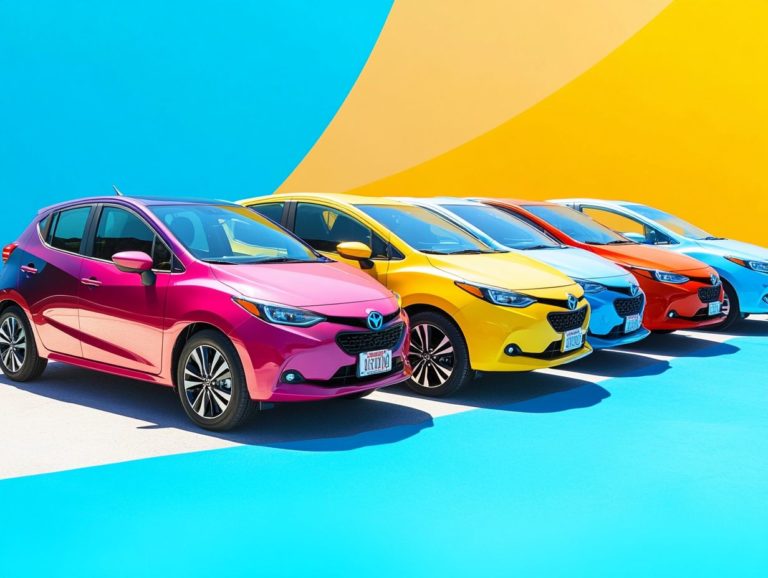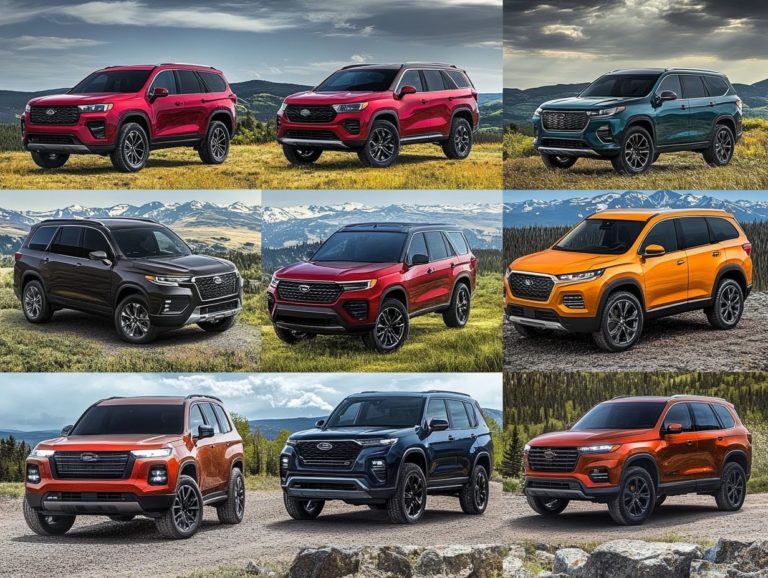User Ratings: Most Fuel-Efficient SUVs of 2023
In today s eco-conscious landscape, fuel efficiency in SUVs has become a priority for discerning drivers.
This article showcases the top 10 most fuel-efficient SUVs of 2023, emphasizing what sets these vehicles apart in terms of mileage and their positive environmental impact.
Delve into the growing popularity of electric and hybrid options, along with the significant cost savings that come with fuel-efficient driving.
Whether you re in search of luxury or a more budget-friendly choice, uncover the key factors that will guide you in selecting the perfect SUV tailored to your lifestyle and financial considerations.
Contents
- Key Takeaways:
- 1. Top 10 Most Fuel-Efficient SUVs of 2023
- 2. What Makes an SUV Fuel-Efficient?
- 3. The Rise of Electric and Hybrid SUVs
- 4. The Impact of Fuel Efficiency on the Environment
- 5. The Cost Savings of Owning a Fuel-Efficient SUV
- 6. How to Measure Fuel Efficiency in SUVs
- 7. The Importance of Regular Maintenance for Fuel Efficiency
- 8. Factors That Affect Fuel Efficiency in SUVs
- 9. The Future of Fuel Efficiency in SUVs
- 10. The Role of Government Regulations in Promoting Fuel Efficiency
- 11. The Most Fuel-Efficient SUVs by Class
- 12. The Top Luxury Fuel-Efficient SUVs
- 13. The Best Affordable Fuel-Efficient SUVs
- 14. The Most Popular Fuel-Efficient SUVs
- 15. How to Find the Best Fuel-Efficient SUV for Your Needs
- What Are the Benefits of Owning a Fuel-Efficient SUV?
- Frequently Asked Questions
- What are the top-rated SUVs for fuel efficiency in 2023?
- How do user ratings determine the most fuel-efficient SUVs?
- Which SUV has the best gas mileage in 2023?
- What makes the Honda CR-V Hybrid stand out in user ratings?
- Are there any luxury SUVs that rank high in fuel efficiency according to user ratings?
- How can I find the most fuel-efficient SUV for my specific needs?
Key Takeaways:

- The rise of electric and hybrid SUVs is making a significant impact on fuel efficiency and the environment, with many options now available for consumers.
- Regular maintenance is crucial for maintaining fuel efficiency in SUVs. Factors like tire pressure and driving habits also affect the overall efficiency of a vehicle.
- When shopping for a fuel-efficient SUV, consider the cost savings and the specific needs and preferences to find the best fit for your lifestyle.
1. Top 10 Most Fuel-Efficient SUVs of 2023
As you navigate through 2023, the automotive market has unveiled an impressive array of SUVs that excel in fuel efficiency. These vehicles are practical choices and environmentally conscious options for those who prioritize eco-friendly driving.
The latest models shine with their smart design and latest tech, which significantly enhance their fuel economy. Take the RAV4, for example it boasts an impressive average of 40 mpg on the highway, thanks to its hybrid powertrain, which combines a gas engine with electric assistance. With a competitively priced starting MSRP, it delivers outstanding value without skimping on features like adaptive cruise control and lane-keeping assist.
The Highlander a three-row SUV makes a strong case for families with its hybrid version, offering up to 36 mpg combined. The Tucson stands out with its innovative smart drive modes designed to optimize efficiency across various terrains, catering to budget-conscious buyers with its appealing starting price.
These standout features make these SUVs not just efficient but exciting choices for eco-friendly drivers!
2. What Makes an SUV Fuel-Efficient?
Understanding what makes an SUV fuel-efficient requires a deep dive into various components, including the type of powertrain, weight distribution, and the advanced automotive technologies that contribute to overall efficiency.
Hybrid technology plays a vital role in this equation, merging electric and traditional gasoline power to enhance your driving experience while minimizing fuel consumption.
When weighing all-wheel drive (AWD) against front-wheel drive (FWD), you ll find that AWD often delivers better traction but can fall short in fuel economy due to added weight and complexity. In contrast, FWD vehicles typically shine in terms of efficiency, especially under normal driving conditions.
Manufacturers are constantly pushing the envelope to improve fuel economy. Models like the Toyota RAV4 Hybrid and Honda CR-V Hybrid deftly combine the advantages of hybrid technology with the practicality of spacious interiors, appealing to those who seek greener alternatives without compromising on performance.
Explore these SUV options today and drive towards a greener future!
3. The Rise of Electric and Hybrid SUVs
The automotive industry is experiencing a remarkable surge in electric and hybrid SUVs, fueled by your growing demand for eco-friendly vehicles that don t sacrifice performance or style.
This trend emerges from new technologies that enhance battery efficiency and overall vehicle performance. Brands like Toyota and Honda have taken the lead in the hybrid arena, offering models that seamlessly combine fuel efficiency with strong capabilities.
Meanwhile, Lexus and Ford have fully embraced the electric shift, launching SUVs that deliver not only lower emissions but also exhilarating torque and acceleration.
Government incentives and tax benefits are making these vehicles more attainable for a wider audience, encouraging your transition toward sustainable driving. As emission regulations become stricter, you’ll likely be drawn to these innovative alternatives that promise a perfect harmony of environmental responsibility and driving enjoyment.
4. The Impact of Fuel Efficiency on the Environment
Fuel efficiency in SUVs holds immense importance in minimizing environmental impact, as improved MPG ratings directly lead to lower CO2 emissions and a reduced carbon footprint.
Research shows that for every 1% increase in fuel economy, there’s a corresponding 0.4% reduction in greenhouse gas emissions. With climate change becoming an ever-pressing concern, this is truly significant.
Using less fossil fuel helps save our natural resources. It also improves air quality in your community.
The U.S. Environmental Protection Agency (EPA) estimates that if all light-duty vehicles were equipped with fuel-efficient engines, it could prevent the release of over 300 million metric tons of CO2 each year. Embracing better fuel efficiency not only benefits the planet but also offers long-term economic advantages for you and industries alike.
5. The Cost Savings of Owning a Fuel-Efficient SUV
Imagine the money you’ll save with a fuel-efficient SUV! Owning a fuel-efficient SUV can bring you substantial cost savings over time.
Consider the stark differences in fuel expenses among various models. For example, while a popular mid-sized fuel-efficient SUV might have a higher initial MSRP, its superior miles per gallon (MPG) can lead to significant savings compared to less efficient alternatives.
Over the years, these savings can not only cover that higher upfront cost but also contribute to a solid financial strategy. With rising fuel prices, you need a model that offers impressive efficiency.
Understanding these dynamics gives you the power to make informed decisions about your investment.
6. How to Measure Fuel Efficiency in SUVs
Measuring fuel efficiency in SUVs requires you to understand various metrics, like MPG (miles per gallon). These can be broken down into combined, highway, and city ratings, giving you a well-rounded view of a vehicle’s performance.
However, don t forget that real-world driving conditions play a crucial role in how efficiently an SUV operates. Your driving style, traffic conditions, and the type of terrain you encounter can significantly affect fuel consumption.
For example, an SUV may shine in controlled environments but struggle in stop-and-go city traffic, emphasizing the importance of these metrics for you as a potential buyer.
By analyzing fuel efficiency data, you can make informed decisions that align with your lifestyle and driving habits, ensuring you choose a vehicle that perfectly balances economy and performance according to your needs.
7. The Importance of Regular Maintenance for Fuel Efficiency

Regular maintenance is essential for preserving fuel efficiency in your SUV. This ensures that every component from the engine to the tires is functioning at its best.
By taking proactive steps, such as scheduling timely oil changes, you can significantly enhance engine lubrication, leading to improved overall efficiency.
Routine checks of tire pressure are equally important. Under-inflated tires create unnecessary drag, forcing your engine to work harder and consume more fuel.
Don t overlook engine tune-ups. These are checks that fix small problems, like worn spark plugs or dirty air filters, to keep your engine running smoothly.
Neglecting these maintenance tasks often results in diminished vehicle performance and increased fuel consumption, affecting not only your wallet but also your overall driving experience.
8. Factors That Affect Fuel Efficiency in SUVs
Several factors influence the fuel efficiency of your SUV, including vehicle weight, driving habits, and the type of powertrain you choose. All of these can significantly impact overall performance.
Beyond these internal elements, external factors also play a crucial role. Weather conditions, such as strong headwinds or heavy rain, can increase energy consumption as your engine works harder to maintain speed.
Additionally, your cargo load and driving conditions think traffic congestion and road quality can further exacerbate fuel usage.
To combat these influences, you should consider:
- Planning trips during optimal weather
- Reducing excess weight by removing unnecessary items
- Maintaining a consistent speed to enhance miles per gallon
Take charge of your driving habits and the surrounding conditions. You can seize these opportunities to maximize fuel efficiency today!
9. The Future of Fuel Efficiency in SUVs
The future of fuel efficiency in SUVs is indeed bright, as emerging technologies in hybrid and electric powertrains are poised to transform the automotive landscape and provide you with greener options.
As manufacturers sharpen their focus on sustainability, innovations in battery storage become essential. This allows you to travel longer distances on a single charge while minimizing the hassle of frequent recharging.
Advancements in aerodynamics are also improving SUVs, significantly reducing drag and enhancing fuel efficiency. This benefits your wallet and the environment.
The integration of lightweight materials is also pivotal. Shedding excess weight not only boosts your mileage but also elevates vehicle performance.
Collectively, these trends signal a shift in market dynamics, favoring vehicles that align with your desire for both efficiency and performance, all while being kinder to our planet.
10. The Role of Government Regulations in Promoting Fuel Efficiency
Government regulations significantly influence fuel efficiency in the automotive industry. They establish the standards that manufacturers must adhere to in order to ensure environmentally friendly vehicles are accessible to you.
These changing regulations shape technology in design and manufacturing and impact market dynamics.
With rising fuel economy standards and stringent emissions targets imposed by authorities, automakers are driven to invest in innovative alternatives like hybrid and electric technologies. This compels companies to reassess their strategies to maintain competitiveness, ultimately impacting production costs and vehicle pricing.
As a result, you, as a consumer, become more discerning, often gravitating toward options that align with both regulatory frameworks and your values regarding sustainability. This shift is actively reshaping the automotive landscape.
11. The Most Fuel-Efficient SUVs by Class
Identifying the most fuel-efficient SUVs by class gives you the power to make informed choices tailored to your unique needs. Whether you’re on the hunt for a compact model perfect for city driving or a spacious three-row SUV designed for family adventures while enjoying impressive fuel economy.
Each category boasts standout contenders that deliver remarkable efficiency without compromising functionality. For instance, if you opt for a compact SUV like the Honda HR-V, you’re looking at around 28 MPG combined, making it an excellent choice for urban dwellers who value both maneuverability and fuel savings.
For families, the three-row SUVs like the Toyota Highlander are hard to beat. Its hybrid variant achieves an impressive 36 MPG, catering to larger groups while keeping travel costs in check.
Even in the luxury segment, options like the Lexus RX 450h prove that elegance and efficiency can coexist, offering about 30 MPG. With these choices, you can enjoy high-end features without the guilt of excessive fuel consumption.
12. The Top Luxury Fuel-Efficient SUVs
Luxury fuel-efficient SUVs present you with an enticing blend of luxury and environmental awareness, seamlessly combining top-tier performance with innovative technology to achieve remarkable fuel economy.
These elite vehicles redefine the driving experience, allowing you to navigate the roads with both style and responsibility. With features such as hybrid engines, which use both gasoline and electric power, advanced aerodynamics, and lightweight materials, these luxury SUVs are designed for those who demand both elegance and efficiency.
For example, automakers have incorporated cutting-edge infotainment systems, sumptuous interiors, and dynamic driving capabilities tailored to your discerning tastes. This ensures that every journey is not just a drive, but a memorable experience. These models not only delight luxury enthusiasts but also captivate environmentally conscious drivers who want comfort without compromise. Explore these exciting options today!
13. The Best Affordable Fuel-Efficient SUVs
Affordable, fuel-efficient SUVs offer you practical options that perfectly balance performance and style. They are ideal for families and individuals who value both functionality and aesthetics.
These vehicles come packed with impressive features, including advanced safety systems, spacious interiors, and modern technology that elevate your driving experience. For those who are budget-conscious, the combination of a reasonable MSRP and outstanding fuel economy is particularly tempting, ensuring that maintenance costs stay low over time.
The ease with which these SUVs navigate urban landscapes and weekend getaways solidifies their reputation as an excellent investment for anyone seeking practicality and comfort all without straining the wallet.
14. The Most Popular Fuel-Efficient SUVs

The most sought-after fuel-efficient SUVs mirror your evolving preferences. They showcase models that have captured attention in the market for their reliability, performance, and eco-friendly attributes.
These vehicles not only cater to your eco-conscious mindset but also come equipped with advanced technological features that elevate your driving experience. With more consumers like you prioritizing sustainability without compromising on comfort, it s no wonder that brands such as Toyota and Honda consistently top the sales charts.
Recent market statistics reveal a notable rise in your interest in hybrids and electric SUVs. This trend is bolstered by glowing reviews that highlight their impressive fuel efficiency and low emissions. As the automotive landscape shifts, these models are undoubtedly set to lead the way in both consumer sentiment and sales figures.
15. How to Find the Best Fuel-Efficient SUV for Your Needs
Finding the best fuel-efficient SUV tailored to your needs requires thoughtful evaluation of several factors, including your budget, space requirements, and desired features. This ensures you make an informed decision that truly fits your lifestyle.
In today s market, comparing key elements such as miles per gallon (MPG) which indicates how far you can drive on one gallon of fuel and the manufacturer s suggested retail price (MSRP), which represents the vehicle’s recommended selling price, is imperative. These factors significantly influence your long-term fuel costs and financial parameters.
Safety ratings are equally crucial. You can refer to reputable automotive publications for comprehensive assessments and comparisons of these scores, providing you with the peace of mind you’re looking for.
Online reviews provide valuable insights from current owners, helping align your options with your personal preferences and driving habits. By taking the time to thoroughly research and weigh these factors, you ll be poised to make a smarter purchase that enhances your lifestyle.
What Are the Benefits of Owning a Fuel-Efficient SUV?
Owning a fuel-efficient SUV offers a wealth of benefits, from substantial cost savings on fuel to a diminished environmental impact. This makes it an intelligent choice for both your wallet and the planet.
These vehicles generally achieve higher miles per gallon compared to traditional SUVs, translating into noticeable savings at the pump over time. By choosing a fuel-efficient SUV, you actively contribute to lower greenhouse gas emissions, aiding in the fight against climate change. Furthermore, many countries provide tax incentives to promote environmentally friendly vehicle options, allowing you to recoup part of your initial investment.
When you compare fuel-efficient SUVs to traditional models that tend to consume more fuel and emit higher levels of pollutants, the advantages become evident both for your personal finances and for cultivating a healthier environment.
What Are the Drawbacks of Owning a Fuel-Efficient SUV?
While fuel-efficient SUVs present numerous benefits, you should also weigh the potential drawbacks. These include performance limitations compared to their gas-powered counterparts and the often higher prices of these models.
You may be concerned that these vehicles lack the power and speed typically associated with traditional SUVs, which is vital if you prioritize a dynamic driving experience. Additionally, the initial investment for a fuel-efficient or hybrid model can be notably higher, leading you to wonder if the long-term fuel savings will truly justify those upfront costs.
However, it s essential to recognize that advancements in technology have significantly enhanced the performance of these models. Various financing options are now available to help ease those initial expenses. As the market for electric vehicles continues to grow, availability is becoming less of a concern, with more manufacturers providing competitive options tailored to meet diverse driving needs.
How Can a User Maintain the Fuel Efficiency of Their SUV?
Maintaining the fuel efficiency of your SUV requires a proactive approach, starting with regular servicing and adopting efficient driving habits that can significantly enhance your MPG and overall performance.
To achieve optimal performance, conducting routine maintenance checks is crucial. This includes monitoring your engine s health, changing the oil as recommended, and ensuring your air filters remain clean.
Paying attention to tire care keeping them properly inflated and rotating them regularly can make a noticeable difference in your fuel consumption. Practicing smoother acceleration and braking techniques will help minimize fuel waste. Gradually increasing your speed and maintaining a steady pace on the highway will further contribute to improved mileage, ultimately reducing how often you need to refuel and saving you both time and money.
What Are the Common Myths About Fuel Efficiency in SUVs?
Numerous myths about fuel efficiency in SUVs can cloud your judgment regarding their performance, sparking debates about their role in the eco-friendly landscape.
Take, for example, the common belief that hybrid vehicles inherently deliver better fuel efficiency compared to their gasoline-only counterparts. Thanks to advancements in engine technology, some modern SUVs are achieving remarkably competitive mileage figures, sometimes even matching or surpassing those of certain sedans.
There’s also a widespread assumption that a vehicle’s weight is directly linked to its fuel consumption, suggesting that heavier SUVs will always drain more gas. In reality, factors like aerodynamics and engine efficiency play crucial roles in determining fuel economy.
Understanding these elements is essential for making informed decisions about vehicle efficiency.
What Are the Future Innovations in Fuel-Efficient SUVs?
Exciting changes are coming for fuel-efficient SUVs! Groundbreaking innovations in technology will boost both efficiency and your driving experience while meeting the demands of today s discerning driver.
As manufacturers delve into advanced battery technologies, these vehicles will evolve to support longer journeys while minimizing carbon footprints, which refers to the impact of your vehicle on the environment.
Lightweight materials will be expertly integrated into designs, enhancing performance and fuel efficiency, allowing you to enjoy a more agile ride without sacrificing safety.
Sophisticated software that learns and adapts to your driving patterns optimizes energy consumption, ensuring each trip is as economical as possible. These advancements are not just reshaping the automotive landscape but also aligning seamlessly with your growing preferences for sustainability, comfort, and state-of-the-art features.
Frequently Asked Questions

What are the top-rated SUVs for fuel efficiency in 2023?
According to user ratings, the top-rated SUVs for fuel efficiency in 2023 include the Toyota RAV4 Hybrid, Honda CR-V Hybrid, and Ford Escape Hybrid.
How do user ratings determine the most fuel-efficient SUVs?
User ratings consider factors such as gas mileage, hybrid technology, and overall performance to determine the best hybrid cars of 2023.
Which SUV has the best gas mileage in 2023?
The Toyota RAV4 Hybrid currently has the best gas mileage among SUVs in 2023, with an average MPG of 41 in the city and 38 on the highway.
What makes the Honda CR-V Hybrid stand out in user ratings?
The Honda CR-V Hybrid has received high ratings for its impressive fuel economy, spacious interior, and advanced safety features.
Are there any luxury SUVs that rank high in fuel efficiency according to user ratings?
Yes, the Lexus NX Hybrid and BMW X3 Hybrid are both highly rated by users for their luxury features and fuel efficiency in 2023.
How can I find the most fuel-efficient SUV for my specific needs?
You can use user ratings and research factors such as MPG, hybrid options, and overall performance to find the most fuel-efficient SUV that meets your specific needs in 2023. Check out user reviews of the best performance cars of 2023 to ensure you don’t miss out on the latest innovations that can save you money and fuel!






